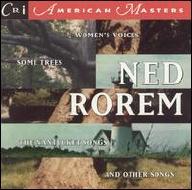Rorem was the second of two children of Clarence Rufus Rorem, one of the founders of the Blue Cross, and Gladys Miller Rorem, a peace activist. The family soon moved to Chicago, where Rorem began studying piano and where he heard such famous performers live as Josef Hofmann, Sergey Rachmaninov, and the Ballets Russes. An early teacher exposed him to Debussy and the impressionists. Subsequent teachers taught him about American contemporary composers like Griffes and John Alden Carpenter, as well as the blues of Billie Holiday, and Rorem learned to notate the little tunes he had composed.
By the age of 16, he had graduated from high school and already performed a concerto with the American Concerto Orchestra. He studied music theory with Leo Sowerby at the American Conservatory for a brief period before entering Northwestern University, where his time was largely spent absorbing a piano repertoire. In 1943, he accepted a scholarship from the Curtis Institute in Philadelphia, where he would study counterpoint with Rosario Scalero and musical-dramatic forms with Gian Carlo Menotti. After only a year there, Rorem moved to New York City, where he worked as Virgil Thomson's copyist in exchange for $20 a week plus composition lessons. Rorem also worked as rehearsal accompanist for Martha Graham and Eva Gauthier. Eventually, he entered Juilliard, where he completed his bachelor's (1946) and master's (1948) degrees. He also studied with Aaron Copland during two summers at Tanglewood.
An award allowed Rorem to travel to France. What was intended to be a three-month visit ended up lasting 12 years. However, the first portion of his stay was largely spent in Morocco at the home of a friend, where he had the peace and quiet requisite for the 20 or so large-scale works he produced during this period. His work earned more honors, including the Lili Boulanger Award in 1950 and a Fulbright Fellowship the following year. At this point, Rorem went on to Paris to study with Honegger. Through the influence of the Vicomtesse Marie-Laure de Noailles, he entered a social circle that included Jean Cocteau, Francis Poulenc, and Georges Auric. During this time, he also wrote several rather explicit diaries that were published a decade later, to the shock and delight of many.
Rorem returned to New York in 1958 and, during the next few decades, held teaching positions at the University of Buffalo (1959-1960), the University of Utah (1965-1966), and the Curtis Institute (1980-1986). He remained more of a composer than pedagogue and was widely revered as a modern master of the art song genre. He received a Pulitzer Prize in 1976 for Air Music, two Guggenheim Fellowships, and commissions from several major symphony orchestras. Rorem also earned the Composer of the Year award from Musical America in 1998 and the American Society of Composers, Authors, and Publishers (ASCAP) Lifetime Achievement Award in 2003. He continued composing well into the 21st century, penning the opera Our Town in 2005, Four Sonnets of Shakespeare for tenor Andrew Kennedy in 2008, and the 2014 organ work Recalling Nadia. Rorem died at his home in Manhattan on November 18, 2022, at the age of 99. ~ Jeremy Grimshaw, Rovi


















